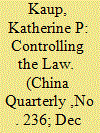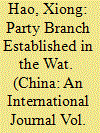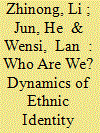| Srl | Item |
| 1 |
ID:
167075


|
|
|
|
|
| Summary/Abstract |
Millions of China's ethnic minority citizens remain subject to competing legal standards, even as state officials strive to strengthen a unified notion of state law. Minority customary law continues to bind many minority citizens in both civil and criminal arenas and often conflicts directly with state law. What happens when these laws conflict? Based on fieldwork in Yunnan, this article shows how local officials and communities navigate legal pluralism and what legal and policy provisions guide them. Granting local judges discretionary authority to set aside state law in favour of customary law, although seemingly undermining law enforcement, may in the long run be the best path to strengthening rule of law in China's minority regions.
|
|
|
|
|
|
|
|
|
|
|
|
|
|
|
|
| 2 |
ID:
190387


|
|
|
|
|
| Summary/Abstract |
The Communist Party of China enhanced its local presence by establishing a branch in the Theravada Buddhist wat in Dehong. Such direct political engagement in a religious venue, however, does not lead to grievances from the locals. This article finds that if the purely ideological differences can be well managed at the local level, the religion and the Party can cooperate with each other and maintain a harmonious relationship. This article reflects on the state–religion antagonism paradigm and argues that an alternative paradigm—an interests-based paradigm—should be prioritised when studying relations between the state and religion in China.
|
|
|
|
|
|
|
|
|
|
|
|
|
|
|
|
| 3 |
ID:
169405


|
|
|
|
|
| Summary/Abstract |
While the Chinese government officially recognises only 55 ethnic minorities, vernacular identification is becoming increasingly dynamic in the context of modernisation and globalisation. Rather than adopting the perspective of dichotomy of assimilation and ethnic competition that followed after official Chinese identification, this research reveals the complexity and heterogeneity of ethnic identity by examining the identification process of the Malimasa people in Yunnan province, south-west China, who are an officially unrecognised group. Using an ethnographic approach to conduct an in-depth case study, this research examines the differences in the identification processes and local narratives of three Malimasa communities. The research findings suggest that three forces, i.e. the multicultural ethnic context, economic policy and government policy, have shaped the Malimasa people's identification process in different ways, even though all three communities were settled in a small geographic area and share a common history. As such, the research calls for further research on officially unrecognised groups, deeper reflection on policy reform and greater attention directed to ethnic variations and diversity. These measures will help to improve ethnic consolidation and conservation of cultural diversity in response to the Chinese central government's concerns.
|
|
|
|
|
|
|
|
|
|
|
|
|
|
|
|